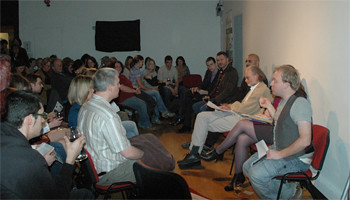The essay below is written by Professor Ralph Fevre from the Cardiff School of Social Sciences at Cardiff Univeristy.
Some movies bust a gut to capture the spirit of a particular time and place, not simply in order to convince the audience of the authenticity of their story or for some other instrumental purpose, but because someone behind the movie believes it is simply worth recording what people’s lives were like then and there. Is The Master trying to capture some aspects of post-war America that are worthy of remembering?
Given the demands of the tale it tells, and the way it tells it (with its deliberate anachronisms of various kinds) you might think there would have to be another, more accessible, purpose to the movie. The obvious one might indeed be recording something we need to know about that time and place, but working out what those aspects might be may require a bit of help from some sociology that was written, quite a long time ago now, with the same end in mind.
Some movies bust a gut to capture the spirit of a particular time and place, not simply in order to convince the audience of the authenticity of their story or for some other instrumental purpose, but because someone behind the movie believes it is simply worth recording what people’s lives were like then and there. Is The Master trying to capture some aspects of post-war America that are worthy of remembering?
Given the demands of the tale it tells, and the way it tells it (with its deliberate anachronisms of various kinds) you might think there would have to be another, more accessible, purpose to the movie. The obvious one might indeed be recording something we need to know about that time and place, but working out what those aspects might be may require a bit of help from some sociology that was written, quite a long time ago now, with the same end in mind.
Roy Wallis’s study of scientology The Road to Total Freedom (1976) was a major contribution to the study of ‘new religious movements’. It was actually concerned with people’s experiences of scientology in Britain, where the cult now had its world headquarters (just as the ‘Cause’ does in The Master). Nevertheless, the sociological lessons Wallis drew from his research had wider currency. Sociology showed that, unlike traditional religion handed down in families and communities, the religious offering that people experienced in the second-half of the twentieth century was more akin to a trip Walmart. They simply bought the religious ideas that fitted their own individual requirements and, very often, their requirements seemed to be quite rational ones: progress in their stalled careers, a cure for insomnia, relief from addictions of various kinds, more successful personal relationships (particularly with the opposite sex).
According to Wallis, scientology might have been the paradigm of the ‘NRMs’ which offered these rational benefits. In The Master, we learn that Freddie Quell (Joaquin Phoenix) has some, if not all, of the familiar, rational reasons for succumbing to Scientology’s pitch but it seems to be something else that actually attracts and holds him. This something was certainly part of the offer of the NRMs but it did not seem to come out of the same locker of rational motivations as all those self-help and self-improvement goals. This non-rational component was the offer of a feeling of belonging to something bigger than one’s self and of some certainty about what the right rules were by which life might be lived.
That people should find this offer attractive has fascinated sociology from the years when the discipline began. Sociologists have been drawn to the way that people felt lost and lonely when they were deprived of the sense of belonging offered by a real community, and had to put up with a society made up of individuals where nobody really cared about anyone else. The most famous study of this is also, perhaps, the best-selling sociology book of all time. David Reisman’s The Lonely Crowd, was published in 1950 and it is an eye-witness account of the society which The Master uses as its back-drop. It is in Reisman’s book that you can find Freddie Quell’s personality type, a type Reisman famously called ‘other-directed’, meaning that people followed the crowd because they had neither traditional beliefs to draw on nor an internal ‘moral gyroscope’ which would tell them what to do, including how to tell right from wrong. Where some of his peers might have turned to opinion polls and self-help books and magazines, Freddie Quell turns to the charismatic character played by Phillip Seymour Hoffman, who bears a family-resemblance to Ron Hubbard, the founder of scientology, for the absent community and the rules he needs to live by. Freddie is not so sure he wants to find a way out of his alcoholism or his one-dimensional relationships with women, but Hoffman’s character offers him something he really needs. To understand what it is, we need to know about the society that creates him and for that we still need The Lonely Crowd.
According to Wallis, scientology might have been the paradigm of the ‘NRMs’ which offered these rational benefits. In The Master, we learn that Freddie Quell (Joaquin Phoenix) has some, if not all, of the familiar, rational reasons for succumbing to Scientology’s pitch but it seems to be something else that actually attracts and holds him. This something was certainly part of the offer of the NRMs but it did not seem to come out of the same locker of rational motivations as all those self-help and self-improvement goals. This non-rational component was the offer of a feeling of belonging to something bigger than one’s self and of some certainty about what the right rules were by which life might be lived.
That people should find this offer attractive has fascinated sociology from the years when the discipline began. Sociologists have been drawn to the way that people felt lost and lonely when they were deprived of the sense of belonging offered by a real community, and had to put up with a society made up of individuals where nobody really cared about anyone else. The most famous study of this is also, perhaps, the best-selling sociology book of all time. David Reisman’s The Lonely Crowd, was published in 1950 and it is an eye-witness account of the society which The Master uses as its back-drop. It is in Reisman’s book that you can find Freddie Quell’s personality type, a type Reisman famously called ‘other-directed’, meaning that people followed the crowd because they had neither traditional beliefs to draw on nor an internal ‘moral gyroscope’ which would tell them what to do, including how to tell right from wrong. Where some of his peers might have turned to opinion polls and self-help books and magazines, Freddie Quell turns to the charismatic character played by Phillip Seymour Hoffman, who bears a family-resemblance to Ron Hubbard, the founder of scientology, for the absent community and the rules he needs to live by. Freddie is not so sure he wants to find a way out of his alcoholism or his one-dimensional relationships with women, but Hoffman’s character offers him something he really needs. To understand what it is, we need to know about the society that creates him and for that we still need The Lonely Crowd.








No comments:
Post a Comment